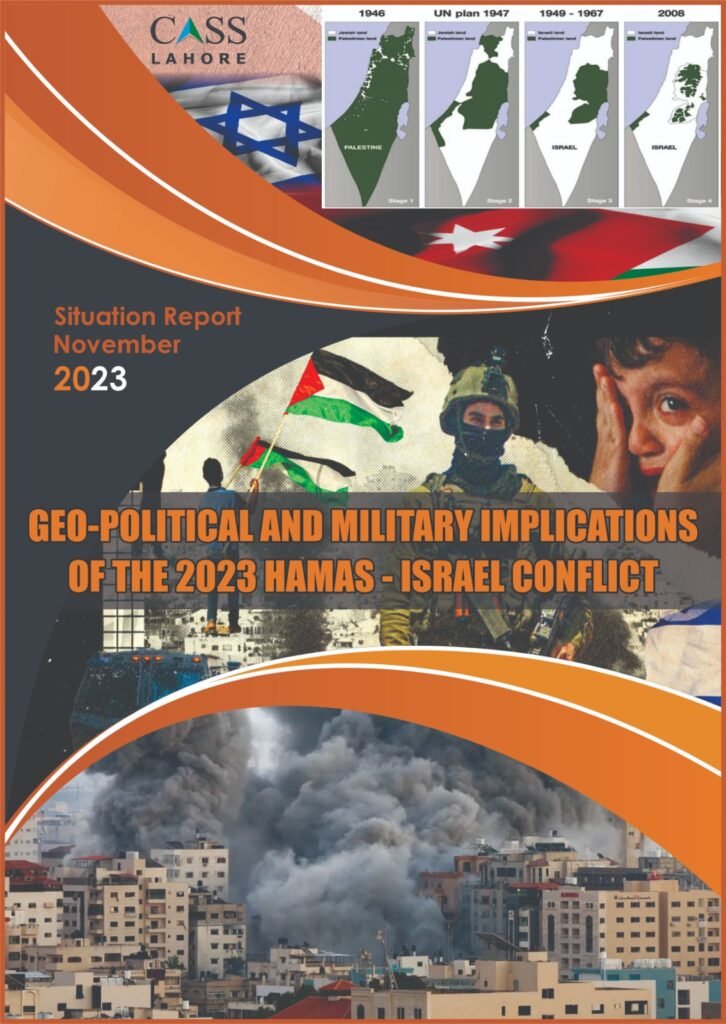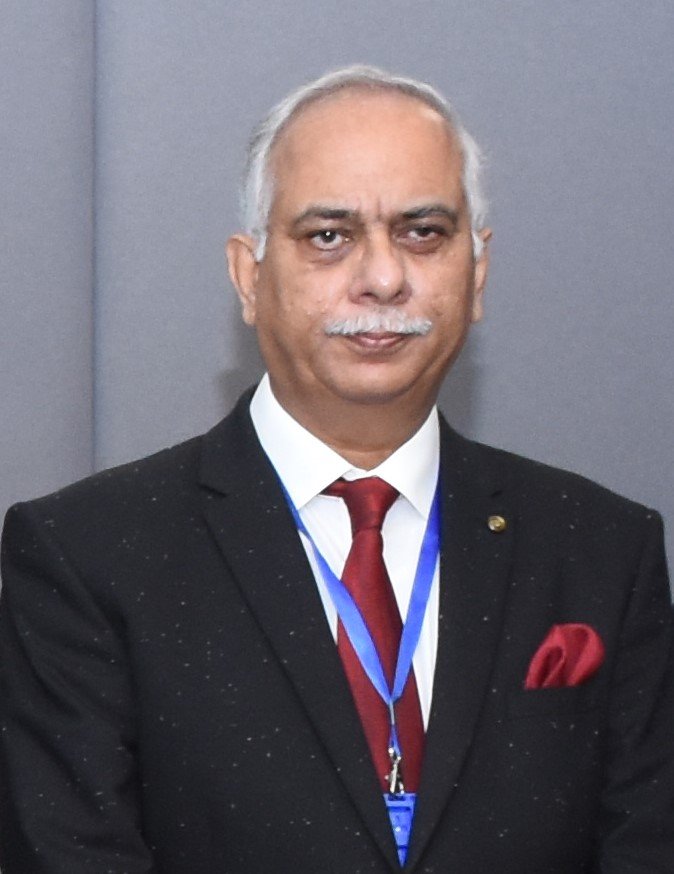
Situational Paper
Geo-Political and Military Implications of the 2023 Hamas – Israel Conflict
November 2023
Executive Summary
This report delves into the various dimensions of the ongoing conflict between Hamas and Israel, considering that the evolving nature of the situation has strong ramifications for the region and beyond. It illustrates the risks of regional spillover, global ripple effects, depraved diplomatic manoeuvres, and a paradigm shift in military tactics. Moreover, it projects conceivable long-term ramifications for the Kashmir conflict if wrong lessons or motivations are drawn by the involved parties.
Perpetual Israeli oppression denying breathing space to Palestinians has been the prime provocation for Hamas to launch an unprecedented offensive, namely “Operation Al-Aqsa Flood”, against Israel on the 7th of October. Hamas’s tactical innovation, sophisticated communication, and strategy duped Israeli security by all standards. However, Israel’s disproportionate counter-operation has been marked by blatant violations of human rights and rules of war.
The alarming escalation of the conflict has incurred human catastrophe on both sides of the divide, with the death toll mounting, infrastructure being destroyed, and public health worsening. By October 31, at least 8,805 Palestinians had been killed in Gaza, including 3,457 children and 2,290 women. On the other hand, the death toll on the Israeli side was around 1,400. Moreover, an estimated 200 Israeli civilians were being held hostage by Hamas. The horrendous death toll includes women and children, which reflects grave human rights violations during the conflict by both sides.
Considering these developments, this report highlights convoluted factors, both internal and external, to analyse all possible catalytic elements behind the current Hamas-Israel conflict. Internal factors include grave human rights atrocities by Israeli forces against the people of Gaza, the status of Jerusalem, the Palestinian refugee crisis, security fences, and economic insecurities. The external factors shaping the conflict include the morphing global political order, shifting alliances, and the US-led normalisation process between Israel and the Arab countries. The internal factors, coupled with external factors, made such an offensive attack a rational and cost-effective option for Hamas to ensure its security and political imperatives.
This report further highlights global responses which have been marked by geo-political frictions. The conflict tested the clouts of regional and global powers at a time when the prevalent international structure was losing its sway due to multiple seismic shifts. The United States has reaffirmed its support for Israel both militarily and diplomatically. Russia has expressed deep concerns about the impact on civilians and has supported the establishment of an independent Palestinian state. China has called for an immediate ceasefire and protection of civilians. Iran has strongly criticised Israel’s actions and expressed support for Palestinian self-defence.
Saudi Arabia has urged an immediate halt to the violence and criticised the United Nations Security Council’s (UNSC) inaction while backtracking from Arabs’ normalisation of relations with Israel. Turkish President Recep Tayyip Erdoğan has condemned Israel’s actions and offered to mediate, while Qatar has blamed Israel for the escalation. India has shown solidarity with Israel while reiterating its support for the Palestinian right to self-determination. Pakistan’s response to the conflict involved a call for an immediate ceasefire and deployment of a protection force, with an emphasis on a two-state solution for Palestine. Despite conflicting reactions, there is a growing consensus for a ‘humanitarian pause’ among the international community due to the staggering human toll. However, Israel has rebuffed and given a cold shoulder to such demands and is operating with the utmost immunity to unleash more atrocities on innocent people.
This report also examines strategic drifts in Hamas’ operations as it has employed innovative and unconventional military tactics to accomplish an unprecedented offensive against the Israeli forces. The cost-effective use of small ammunitions and smart technology, in synchronisation, has altered the cost-and-benefit equation of war largely in favour of smaller powers and non-state actors. Furthermore, this report highlights that in war exercises there can be no alternative to motivation and fearlessness. Both have been fundamental drivers for Hamas to carry out a full-throttle offensive to break the myth of Israel’s invincibility.
This report further discusses potential diplomatic, economic, and strategic challenges for Pakistan as it appears that the conflict can spark major regional confrontations. In addition, the report draws parallels between Kashmir and Palestine due to the similitude between freedom movements and tactics used by both oppressors. It also elucidates India and Israel’s violations of UNSC resolutions and war crimes through the use of prohibited weapons. It also points out the replication of tactics by the oppressors and oppressed in Palestine and Kashmir. Furthermore, the possible outcomes of any party learning the wrong lesson have also been elucidated.
Lastly, the report has put forth recommendations for Pakistan. These include aligning with popular sentiments, providing humanitarian aid, seeking a two-state solution, emphasising the legitimacy of self-determination, and highlighting international law violations. This report recommends that Pakistan should play a leadership role in international forums; emphasise the common victimhood of Palestinians and Kashmiris; utilise the media for advocacy; collaborate with Organisation of Islamic Cooperation (OIC) countries; and address the inaction on the UNSC resolutions.
Key Takeaways
The 7 October 2023 Hamas attack on Israel marked a significant intelligence and security failure for Israel, exposing vulnerabilities in its defense systems and shattering perceptions of its military dominance. Israel’s retaliatory actions, including a complete siege and widespread bombardment of Gaza, led to massive civilian casualties and global outrage, yet international efforts for ceasefire and aid remain stalled amid geopolitical divisions. The attack was likely motivated by Hamas’ rivalry with the Palestinian Authority and its intent to disrupt Israeli-Arab normalization, especially with Saudi Arabia. The conflict’s escalation risks a broader regional war, with Hezbollah already involved and the potential for wider international entanglement, particularly for the US. Hamas aims to position itself as the sole representative of Palestinians, challenging the PA’s two-state solution approach. The crisis has damaged the normalization process between Israel and Gulf states and severely impacted the US image in the Islamic world, complicating its planned strategic withdrawal from the Middle East. The war’s political fallout also endangers the future of Israeli Prime Minister Netanyahu, while reigniting global attention on the Palestinian cause and the two-state solution.
Policy Considerations
Pakistan’s policy on the Palestine issue must align with the strong public sentiment of solidarity with the Palestinian people and condemnation of Israel’s illegal occupation. The country should maintain its principled stance by continuing humanitarian aid, particularly for Gaza, and pushing at international forums like the UN for protective measures and justice. Pakistan must advocate for a just resolution based on the two-state solution, with a sovereign Palestine along pre-1967 borders and Al-Quds Al-Sharif as its capital. It is essential to reaffirm that the Palestinian struggle for self-determination is legitimate under international law and should not be equated with terrorism. Pakistan should also reject any false equivalence between the occupying power and the victims, while actively highlighting Israel’s violations of international humanitarian norms. By taking a leadership role in global platforms like the UN and OIC, Pakistan can strengthen its influence, particularly within the Muslim world. Moreover, it should use this opportunity to draw parallels between the injustices faced by Palestinians and Kashmiris, using media platforms to amplify their shared struggle for self-determination and freedom from occupation.
Author(s)



M. Z. Faisal
Director
Nidaa Shahid
Senior Researcher
Bilal Ghazanfar
Associate Senior Researcher
CASS LAhore

The Centre for Aerospace & Security Studies (CASS) was established in July 2021 to inform policymakers and the public about issues related to aerospace and security from an independent, non-partisan and future-centric analytical lens.
CASS Newsletter
- Home
- About Us
- Research Domains
- Publications
- Events
- Gallery
- Contact Us
@2021 - All Right Reserved. Designed and Developed by PenciDesign




